初中英语教师专业知识考试题及答案教学文案
教师资格考试初中英语学科知识与教学能力试卷与参考答案(2024年)
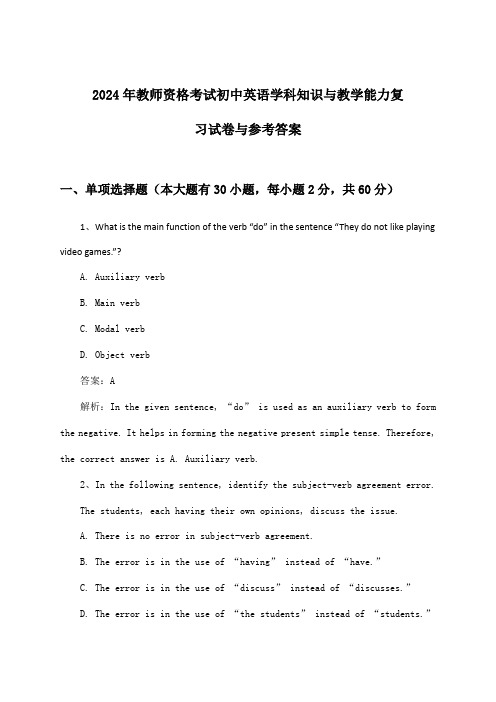
2024年教师资格考试初中英语学科知识与教学能力复习试卷与参考答案一、单项选择题(本大题有30小题,每小题2分,共60分)1、What is the main function of the verb “do” in the sentence “They do not like playing video games.”?A. Auxiliary verbB. Main verbC. Modal verbD. Object verb答案:A解析:In the given sentence, “do” is used as an auxiliary verb to form the negative. It helps in forming the negative present simple tense. Therefore, the correct answer is A. Auxiliary verb.2、In the following sentence, identify the subject-verb agreement error.The students, each having their own opinions, discuss the issue.A. There is no error in subject-verb agreement.B. The error is in the use of “having” instead of “have.”C. The error is in the use of “discuss” instead of “discusses.”D. The error is in the use of “the students” instead of “students.”答案:D解析:The error in the subject-verb agreement is in the use of “the students” instead of “students.” The correct form should be “students discuss” because “students” is a plural noun and requires a plural verb form. Therefore, the correct answer is D. The error is in the use of “the students” instead of “students.”3、The sentence “The book is so fascinating that I couldn’t put it down.” uses the phrase “couldn’t put it down” to express the speaker’s feeling. Which of the followi ng phrases is closest in meaning to “couldn’t put it down”?A)couldn’t stop reading itB)didn’t want to finish itC)didn’t find it interestingD)didn’t understand itAnswer: A) couldn’t stop reading itExplanation: The phrase “couldn’t put it down” is used to desc ribe the feeling of being so engaged in something that you cannot stop doing it. “couldn’t stop reading it” is the closest phrase that conveys this meaning, indicating that the speaker was so fascinated by the book that they couldn’t stop reading it.4、In the following dialogue, which sentence is an example of a yes/no question?A)“How is your family doing today?”B)“Do you have any plans for the weekend?”C)“Are you going to the party tonight?”D)“Can you help me with my homework?”Answer: C) “Are you going to the party tonight?”Explanation: A yes/no question is one that can be answered with a simple yes or no. “Are you going to the party tonight?” is a clear example of a yes/no question because it asks a direct question that can only be answered with a yes or no. The other sentences are open-ended questions that invite a more detailed response.5、In the following sentences, which one uses the correct past perfect tense?A. He had finished the project before he left the company.B. He finishes the project before he left the company.C. He finished the project after he left the company.D. He finished the project when he left the company.Answer: AExplanation: The correct answer is “A” because the past perfect tense is used to express an action that was completed before another past action. In this case, “he had finished the project” indicates that the action of finishing the project happened before he left the company.6、Choose the sentence that correctly uses the present perfect tense.A. I have just arrived at the station.B. I have arrived at the station already.C. I arrived at the station.D. I was arriving at the station when the train left.Answer: AExplanation: The present perfect tense is used to describe an action that started in the past and continues to the present or has a present result. In this case, “I have just arrived at the station” correctly uses the present perfect tense to indicate that the action of arriving has a present result. The other options either do not use the present perfect tense or incorrectly use past simple or past continuous tense.7、The teacher is using a visual aid to help students understand the new vocabulary. Which of the following is the most appropriate visual aid for teaching the word “metropolis”?A) A map of a small townB) A picture of a skyscraperC) A graph showing population growthD) A video of a rural landscapeAnswer: B) A picture of a skyscraperExplanation: The word “metropolis” refers to a large city, often with a significant population and economic importance. A picture of a skyscraper is a visual representation of an urban environment, which would be most appropriate for teaching the word “metropolis.” The other options (A, C, D) do not directly relate to the concept of a large city.8、In a lesson on the past continuous tense, the teacher wants to elicit the correct form of the sentence “I______(watch) TV when he called me.” Whichof the following prompts is the most effective for helping students produce the correct past continuous form?A)“What was I doing when he called me?”B)“What did I do while he called me?”C)“When did I watch TV?”D)“What did I do at that time?”Answer: A) “What was I doing when he called me?”Explanation: The past continuous tense is used to describe an action that was happening at a specific point in the past. The prompt “What was I doing when he called me?” correctly elicits the past continuous form “was watching” to complete the sentence “I was watching TV when he called me.” The other options either use the simple past tense or do not fit the context of the past continuous tense.9、Which of the following sentences uses the subjunctive mood correctly?A) If I was you, I would take the job.B) If I were you, I would take the job.C) If I am you, I would take the job.D) If I be you, I would take the job.Answer: BExplanation: The correct answer is B because the subjunctive mood is used to express hypothetical or contrary-to-fact conditions. He re, “were” is used instead of “was” to express an imaginary situation.10、Identify the type of the sentence: “Do your homework quickly!”A) DeclarativeB) InterrogativeC) ImperativeD) ExclamatoryAnswer: CExplanation: The correct answer is C because the sentence is giving a command or making a request, which is characteristic of an imperative sentence. The use of the base form of the verb “do” along with the exclamation mark emphasizes the command.11.The teacher is using a group discussion activity to teach the students about the main idea of a text. Which of the following statements is most likely to be true in this situation?A)The teacher is encouraging students to work individually.B)The teacher is providing the main idea to the students.C)The teacher is facilitating a group discussion to identify the main idea.D)The teacher is asking students to write a summary of the text.Answer: C) The teacher is facilitating a group discussion to identify the main idea.Explanation: In this context, the teacher is using a group discussion to engage students in identifying the main idea of a text, which is an effective strategy for collaborative learning and comprehension.12.In the context of teaching a new vocabulary word, which of the following activities is most effective for helping students remember and understand the word?A)Reading the word in a sentence and moving on.B)Writing the word multiple times in a paragraph.C)Creating a visual representation of the word using drawings or symbols.D)Asking students to define the word and then use it in a sentence.Answer: D) Asking students to define the word and then use it in a sentence.Explanation: Encouraging students to define a new vocabulary word and then use it in a sentence helps reinforce understanding and retention. It also allows the teacher to assess the students’ comprehension and usage of the word.13、Which of the following sentences uses the subjunctive mood correctly?A) If I was you, I would take the job.B) If she were me, she wouldn’t go.C) If he be a doctor, he would give you advice.D) If they was here yesterday, they would have seen the accident.Answer: B) If she were me, she wouldn’t go.Explanation: The subjunctive mood is used to express hypothetical or contrary-to-fact situations. Option B correctly uses the past subjunctive form “were” to indicate a hypothetical situation.14、Identify the type of sentence that is primarily used to give instructions in an English class.A) InterrogativeB) ExclamatoryC) ImperativeD) DeclarativeAnswer: C) ImperativeExplanation: The imperative sentence is used to give commands or instructions. In an educational setting, teachers often use this type of sentence to direct students’ actions, such as “Please open your books,” or “Write down the new vocabulary.”15.The following sentence is an example of a question type that is often found in the reading comprehension section of the English exam for junior high school teachers. Which of the following is the correct question type?A. Multiple-choice questionB. True or False questionC. Short answer questionD. Matching questionAnswer: AExplanation: The question type described in the prompt is a multiple-choice question, where the examinee is presented with a question and several possible answers to choose from. This is a common format in reading comprehension sections of standardized tests.16.In the context of teaching English at the junior high level, which of the following strategies would be most effective in helping students develop their vocabulary?A. Encouraging students to memorize new words without contextB. Using flashcards to present new vocabulary itemsC. Incorporating vocabulary into context-rich texts and discussionsD. Assigning students to write essays using new vocabulary wordsAnswer: CExplanation: Incorporating vocabulary into context-rich texts and discussions is the most effective strategy for helping students develop their vocabulary. This method allows students to understand the meaning and usage of new words in a real-world context, which aids in long-term retention and practical application.17、Which of the following is NOT a characteristic of communicative language teaching (CLT)?A)Focus on accuracy over fluencyB)Integration of language skillsC)Emphasis on communication competenceD)Student-centered activitiesAnswer: A) Focus on accuracy over fluencyExplanation: Communicative Language Teaching emphasizes fluency and the ability to communicate effectively in real-life situations. While accuracy is important, it is not prioritized over fluency in CLT. The approach advocates for an integrated skills approach where speaking, listening, reading, and writing are developed together, focusing on communication competence and often employing student-centered activities.18、In the context of vo cabulary acquisition, what does the term “depth of processing” refer to?A)The number of times a word needs to be repeated to be memorizedB)The intensity and cognitive effort involved in learning new vocabularyC)The frequency of encountering a word in different contextsD)The depth at which words are printed in a textbookAnswer: B) The intensity and cognitive effort involved in learning new vocabularyExplanation: Depth of processing theory suggests that the level of mental engagement with new information affects how well it is remembered. In vocabulary acquisition, deeper processing involves more than just repetition or surface-level exposure; it includes engaging with the word in meaningful ways that require cognitive effort, such as through use in sentences or association with images or experiences. This deeper engagement tends to lead to better retention and understanding of new vocabulary.19.In a primary school English class, the teacher wants to introduce a new topic about seasons. Which of the following activities would be most appropriate to engage the students in learning about the seasons?A. Reading a short story about a character traveling through different seasons.B. Singing a song about the changes in the weather during different seasons.C. Conducting a science experiment to demonstrate the changes in the Earth’s tilt.D. Showing a documentary film about the different climates around the world.Answer: BExplanation: Singing a song about the changes in the weather duringdifferent seasons would be the most engaging and interactive way to introduce the topic of seasons to primary school students. It allows them to learn through music and movement, which is both fun and educational.20.When designing a lesson plan for teaching the past continuous tense, which of the following teaching strategies would be most effective for a group of middle school students?A. Using a lot of vocabulary exercises and translation tasks.B. Presenting a detailed grammar explanation followed by a series of exercises.C. Creating a scenario where students can act out events that were happening in the past.D. Showing a video clip of a story that is narrated entirely in the past continuous tense.Answer: CExplanation: Creating a scenario where students can act out events that were happening in the past is an excellent teaching strategy for teaching the past continuous tense. It allows students to visualize and experience the language in a real-life context, which aids in their understanding and retention of the tense.21、Which of the following sentences uses the subjunctive mood correctly?A) If he were me, he will do it differently.B) If I was the teacher, I would change the curriculum.C) If she were here, she knows what to do.D) If they were smarter, they would have passed the exam.Answer: D) If they were smarter, they would have passed the exam. Explanation: The correct answer is D because it uses the past unreal conditional (were smarter) along with the conditional perfect (would have passed) to indicate an impossible or highly unlikely condition in the past.22、Identify the type of sentence used in the following example: “Watch out for that dog!”A) DeclarativeB) InterrogativeC) ExclamatoryD) ImperativeAnswer: D) ImperativeExplanation: The correct answer is D because the sentence “Watch out for that dog!” is giving a command or making a request, which is characteristic of an imperative sentence.23.The teacher is introducing a new vocabulary word to the students. Which of the following strategies is most suitable for explaining the word “vulnerable” to the middle school students?A)Presenting the word in a sentence and having students infer its meaning.B)Providing a definition and using synonyms to help students understand the word.C)Drawing a picture that visually represents the word.D)Asking students to give examples of the word in their own sentences.Explanation: B) is the most suitable strategy because providing a definition and using synonyms can help students understand the meaning of the word “vulnerable” in a clearerand more concrete way. This method allows them to build their vocabulary and understandthe word within the context of the language.24.In a middle school English class, the teacher wants to assess the students’ comprehension of a short story. Which of the following assessment methods would be most effective?A)Giving a multiple-choice quiz at the end of the lesson.B)Asking students to write a summary of the story.C)Conducting a group discussion on the characters and themes of the story.D)Having students create a poster depicting the main events of the story.Answer: C)Explanation: C) is the most effective assessment method because it promotes active learning and encourages students to engage with the story’s content. Group discussions allow students to express their thoughts, share ideas, and develop critical thinking skills. This method also provides the teacher with insights into how well the students have comprehended the story’s characters and themes.25、Which of the following sentences correctly uses the subjunctive mood?A) If I was you, I would take the job.B) If I were you, I would take the job.C) If I am you, I would take the job.D) If I be you, I would take the job.Explanation: The correct sentence is “If I were you, I would take the job.” This sentence uses the subjunctive mood with “were” to expr ess a hypothetical situation that is contrary to fact. The subjunctive mood is used here because it’s impossible for someone to literally be another person, making this a hypothetical condition.26、Identify the type of clause in the following sentence:“Even though she was tired, she finished her homework.”A) Independent clauseB) Dependent clauseC) Relative clauseD) Noun clauseAnswer: BExplanation: In the sentence “Even though she was tired, she finished her homework,” “Even though she was tired” is a dependent clause because it cannot stand alone as a complete thought. It provides additional information but relies on the main (independent) clause “she finished her homework” to convey a complete meaning. The dependent clause starts with a subordinating conjunction “even though,” which introduces a condition or contrast to the main action in the independent clause.27.What is the main function of a vocabulary list in the context of teaching English to初中 students?A. To assess the students’ understanding of grammar rules.B. To encourage students to engage in oral communication.C. To provide a list of essential vocabulary words that will be covered in the course.D. To introduce new cultural topics for classroom discussions.Answer: CExplanation: A vocabulary list in the context of teaching English to初中 students primarily serves to provide a structured list of essential vocabulary words that will be covered throughout the course. This helps students to focus on and learn the key terms they need to be familiar with in order to understand and participate effectively in class discussions and tasks.28.In a lesson about the past perfect tense, which of the following sentence structures is most appropriate for illustrating its usage?A. “I had finished my homework before my mother came back from work.”B. “I finished my homework because my mother came back from work.”C. “I will finish my homework if my mother comes back from work.”D. “I was finishing my homework when my mother came back from work.”Answer: AExplanation: The past perfect tense is used to describe an action that was completed before another past action. Therefore, the sentence “I had finished my homework before my mother came back from work.” accurately illustrates the usage of the past perfect tense, as it shows that the homework was completedbefore the mother came back. The other options do not correctly demonstrate the past perfect tense structure.29、Which of the following activities is most suitable for developing studen ts’ speaking skills in a communicative way?A)Reading a passage aloudB)Reciting a poem from memoryC)Engaging in a role-play conversationD)Listening to an audio recording and answering questionsAnswer: C) Engaging in a role-play conversationExplanation: Role-playing encourages spontaneous and interactive communication, which is essential for the development of speaking skills. It allows students to practice using language in a context that simulates real-life situations, thus improving their fluency, pronunciation, and ability to use appropriate language in different social contexts. While options A, B, and D may also contribute to language learning, they do not specifically focus on the interactive and communicative aspects of speaking as effectively as role-plays do.30、When designing a lesson plan, what is the primary purpose of includinga variety of assessment methods?A)To reduce the workload of grading for the teacherB)To cater to different learning styles and needs of studentsC)To make the lesson more interesting and engagingD)To ensure that the lesson covers all the required materialAnswer: B) To cater to different learning styles and needs of studentsExplanation: Incorporating a variety of assessment methods in a lesson plan is important because it helps to address the diverse ways in which students learn and demonstrate their understanding. This approach acknowledges that students have different strengths and preferences when it comes to showing what they know, and it can help to provide a more accurate and comprehensive picture of each student’s abilities. Options A, C, and D, while they may be secondary benefits, do not capture the main educational rationale for using varied assessments, which is to accommodate individual differences among learners.二、简答题(20分)Question: How can teachers effectively integrate technology into their English language teaching to enhance student engagement and learning outcomes?Answer:1.Utilize educational technology tools and platforms such as interactive whiteboards, digital learning management systems, and educational apps to create interactive lessons that engage students in different learning styles.2.Incorporate multimedia resources such as videos, podcasts, and online articles to provide a uthentic language experiences and stimulate students’ curiosity.3.Design and implement online collaborative projects and group activities that encourage students to work together and communicate in English, promotingcommunication skills and teamwork.e language learning software and apps that offer personalized learning experiences, allowing students to progress at their own pace and providing immediate feedback.5.Integrate technology-based formative and summative assessments to monitor students’ pro gress and identify areas for improvement.6.Provide opportunities for students to create digital content, such as presentations, videos, or blogs, to enhance their writing, speaking, and listening skills.7.Utilize educational websites and online forums to expose students to a wider range of English language materials and encourage them to practice English outside the classroom.8.Continuously update one’s knowledge and skills in using educational technology through professional development and online courses.Explanation:Integrating technology into English language teaching can have several positive effects on student engagement and learning outcomes. By incorporating educational technology tools and platforms, teachers can create interactive and engaging lessons that cater to different learning styles, making the learning process more enjoyable and effective. Using multimedia resources helps students gain authentic language experiences and stimulates their curiosity, making the learning process more meaningful. Online collaborative projects and groupactivities foster communication skills and teamwork, which are essential for language learning. Language learning software and apps provide personalized learning experiences, allowing students to progress at their own pace and receive immediate feedback. Formative and summative assessments using technology help teachers monitor students’ progress and identify areas for improvement. Encouraging students to create digital content enhances their writing, speaking, and listening skills. Lastly, utilizing educational websites and online forums exposes students to a wider range of English language materials, promoting continuous learning outside the classroom. Continuous professional development in educational technology is crucial for teachers to keep up with the latest trends and technologies in language teaching.三、教学情境分析题(30分)Question:A middle school teacher is planning a unit on “Hobbies and Interests” for her Grade 8 English class. The class consists of 25 students, with a mix of beginner, intermediate, and advanced learners. The teacher has observed that the students have varying levels of engagement and motivation in English classes. The school has provided a set of multimedia resources, including videos, audio clips, and interactive websites, to support the teaching of this unit.1.Analyze the learning needs of the students in the class.2.Describe how the teacher can utilize the multimedia resources effectivelyto cater to different learning styles and levels.3.Explain how formative and summative assessments can be integrated into the teaching and learning process for this unit.Answer:1.Learning Needs of the Students:•Beginner Level: Students at this level may have difficulty with basic vocabulary and sentence structures related to hobbies and interests. They might struggle to understand and produce simple sentences in English.•Intermediate Level: These students can understand and use some vocabulary and grammar related to the topic but may still need support with more complex structures and advanced vocabulary.•Advanced Level: Students at this level should be able to express their opinions on hobbies and interests fluently and accurately, using a variety of vocabulary and grammar structures.2.Utilizing Multimedia Resources:•For Beginner Level: The teacher can use simple videos and audio clips to introduce new vocabulary and phrases related to hobbies and interests.Interactive websites can be used to practice basic sentence structures and vocabulary through games and exercises.•For Intermediate Level: The teacher can use more complex videos and audio clips that include different accents and vocabulary. Interactive websites can provide more challenging exercises and activities, such as quizzes and discussions.•For Advanced Level: The teacher can use videos and audio clips that require deeper analysis and discussion. Interactive websites can offer moreadvanced activities, such as debates and research projects.3.Formative and Summative Assessments:•Formative Assessments: These can be integrated into the teaching process through activities such as:•Class discussions on hobbies and interests, where students can share their own experiences and opinions.•Quizzes and exercises using interactive websites and multimedia resources to practice vocabulary and grammar.•Peer assessments, where students can provide feedback on each other’s work.•Summative Assessments: These can be conducted at the end of the unit through:• A written test that includes multiple-choice questions, true/false statements, and short answer questions.•An oral presentation or debate on a chosen hobby or interest, where students can demonstrate their knowledge and understanding of the topic.• A project that combines different skills, such as writing a report on a hobby, creating a poster, or preparing a presentation.Explanation:The analysis of the students’ learning needs is essential for the teacher to create an inclusive and effective lesson plan. By utilizing the multimediaresources effectively, the teacher can cater to different learning styles and levels, ensuring that all students can engage with the material. Integrating both formative and summative assessments will help the teacher monitor the progress of each student and provide feedback that can be used to improve future lessons.四、教学设计题(40分)Question: Design a lesson plan for a 45-minute English class for Grade 8 students. The topic of the lesson is “Traveling Abroad.” The lesson should include vocabulary building, reading comprehension, and speaking activities.Lesson Plan:I. Introduction (5 minutes)•Objective: To introduce the topic of traveling abroad and create an interest in the lesson.•Activities:•Teacher shows a few images of famous landmarks from different countries.•Students share their favorite travel destinations and why.II.Vocabulary Building (10 minutes)•Objective: To introduce and practice new vocabulary related to traveling.•Activities:•Teacher presents new words on the board (e.g., backpack, passport, luggage, sightseeing, etc.).。
2023年下半年教师资格证笔试初中英语教学设计真题及参考答案
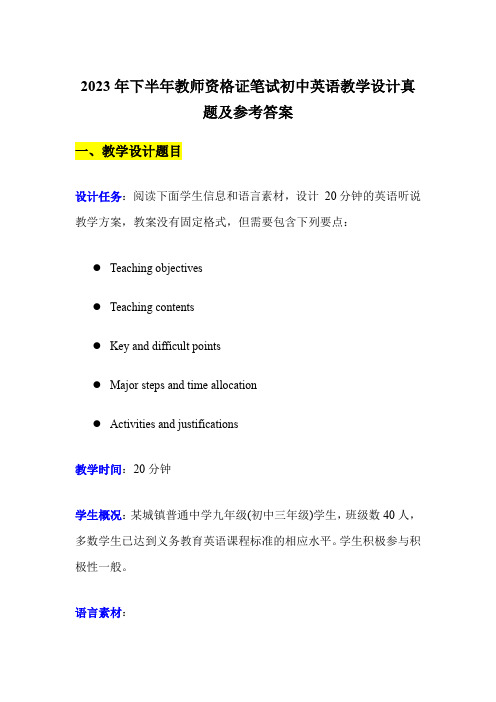
2023年下半年教师资格证笔试初中英语教学设计真题及参考答案一、教学设计题目设计任务:阅读下面学生信息和语言素材,设计20分钟的英语听说教学方案,教案没有固定格式,但需要包含下列要点:●Teaching objectives●Teaching contents●Key and difficult points●Major steps and time allocation●Activities and justifications教学时间:20分钟学生概况:某城镇普通中学九年级(初中三年级)学生,班级数40人,多数学生已达到义务教育英语课程标准的相应水平。
学生积极参与积极性一般。
语言素材:Clara: Guess what? I'm going to Chiang Mai in two weeks.Ben: Wow, sounds like fun! But I believe that April is the hottest month of the year there.Clara: Yes, that's true, but there is a water festival there from April 13th to 15th.Ben: I wonder if it's the same as the Water Festival of the Dai people in Yunnan Province.Clara: Yes, l think so. This is the time of Thai New Year. People go on the streets to throw water at each other.Ben: Cool! But why do they do that?Clara: Because the New Year is a time for cleaning and washing away bad things. Then you'll have good luck in the new year.二、教学设计1. Teaching contents●This is a listening and speaking lesson. It talks about a dialogueabout Clara’s planning a trip to Chiang Mai and mentioned theWater Festival.2. Teaching objectives(1) Language ability●Students can understand the new words and phrases, such as“wonder, throw, wash away, have good luck”and so on.●Through listening, students will understand the main idea of thelistening material and be able to use the target language to talkabout different festivals.(2) Cultural awareness●Students can understand and respect other cultures, whilestrengthening the identity of our own culture.(3) Thinking quality●Students can sort out and summarize the information in thematerial.(4) Learning ability●Students will be willing to take part in the class activities andcooperate with other group members.3. Key and difficult points(1) Key points●Help students know the meaning and usage of the new words andphrases.●Let students get the content of this lesson through listening.(2) Difficult points●How to guide students to utilize the skills to extract information.●To improve the confidence of speaking English and help studentsrealize cultural diversity.4. Major stepsStep 1 Pre-listening (4 mins)(1) New words learning●With the help of some pictures, the teacher will guide students tounderstand the meaning and usage of the new words and phrases,including “wonder, throw, wash away, have good luck”and soon.(2) Prediction●Before listening, the teacher will guide students to make aprediction.●Some hints will be provide to help them.●Hint 1: Words and phrases just refer to.●Hint 2: Some pictures in which students can see differentfestivals.(Justification: The above activities can help students recognize the new words and phrases, remove the barriers, and lay the foundation for the next step of listening.)Step 2 While-listening (10 mins)(1) Extensive listening●Students will listening to the dialogue for the first time to checktheir predictions and conclude the main idea of the dialogue.(2) Intensive listening●Students will listen to the dialogue for the second time and finishthe following task:●True or False●Clara is going to Chiang Mai for two weeks. (T/F)●Water Festival there is form August 13th to 15th. (T/F)●The Water Festival in Chiang Mai is the same as the WaterFestival of the Dai people in Y unnan Province. (T/F)(3) Listening and repeating●Students will listen to the dialogue for the third time and repeatafter it. They should pay attention to the pronunciation andintonation.(Justification: In the process of completing the listening tasks at different levels, students can not only understand the content and certain details ofthe passage, but also improve their listening skills.)Step 3 Post-listening (6 mins)Group discussionStudents will work in groups to discuss the following question: what’s your favorite festival and what special customs do youknow? Several minutes will be given. When time’s up, severalstudents will be invited to share their answers. Then the teacherwill comment on students’performance.(Justification: Group activity will provide the students with the opportunity to apply what they have learned to the situation, improve their English speaking skill and boost their confidence in learning English.)。
初中英语教资试题及答案
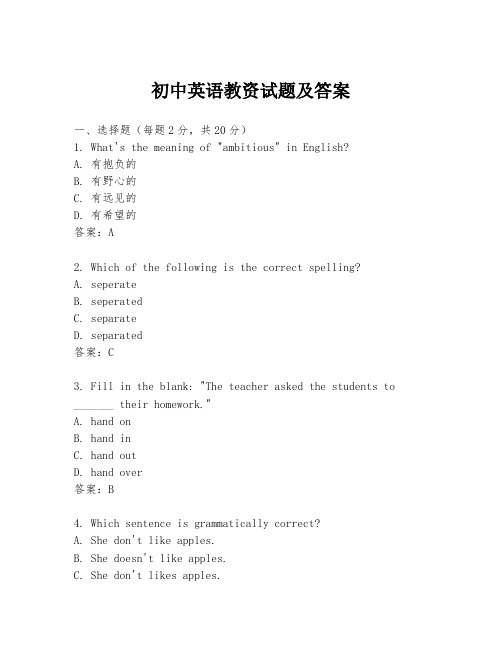
初中英语教资试题及答案一、选择题(每题2分,共20分)1. What's the meaning of "ambitious" in English?A. 有抱负的B. 有野心的C. 有远见的D. 有希望的答案:A2. Which of the following is the correct spelling?A. seperateB. seperatedC. separateD. separated答案:C3. Fill in the blank: "The teacher asked the students to _______ their homework."A. hand onB. hand inC. hand outD. hand over答案:B4. Which sentence is grammatically correct?A. She don't like apples.B. She doesn't like apples.C. She don't likes apples.D. She doesn't likes apples.答案:B5. What does "take after" mean?A. 跟随B. 继承C. 效仿D. 模仿答案:B6. Choose the word that is NOT a synonym of "famous".A. renownedB. notoriousC. celebratedD. distinguished答案:B7. In which sentence is the use of "although" correct?A. Although he is tired, he continues to work.B. He is tired, although he continues to work.C. Although he continues to work, he is tired.D. Although he continues to work, tired he is.答案:A8. Which of the following is the correct way to express "我昨天没有去学校" in English?A. I didn't go to school yesterday.B. I didn't go to school tomorrow.C. I didn't go to school the day before yesterday.D. I don't go to school yesterday.答案:A9. What is the past tense of "build"?A. buildedB. buildedC. builtD. build答案:C10. Fill in the blank: "She is _______ to win the competition."A. possibleB. probableC. likelyD. probable答案:C二、填空题(每题2分,共20分)11. The opposite of "success" is _______.答案:failure12. "To be honest" is an example of a(n) _______ phrase.答案:idiomatic13. The word "library" is a noun that refers to a place where books are _______.答案:kept14. The verb "to imagine" means to form a mental image or_______.答案:conception15. The past participle of "run" is _______.答案:run16. "To be punctual" means to arrive at the _______ time.答案:appointed17. "To apologize" is to express regret or ask pardon for a _______.答案:wrong18. The adjective "expensive" is the opposite of _______.答案:cheap19. "To be bored" means to feel weary or _______ from doing something.答案:tired20. The word "environment" refers to the surroundings or conditions in which a person, animal, or plant _______.答案:lives三、阅读理解(每题4分,共40分)阅读以下短文,并回答21-30题。
初中英语老师专业能力测试题与参考答案
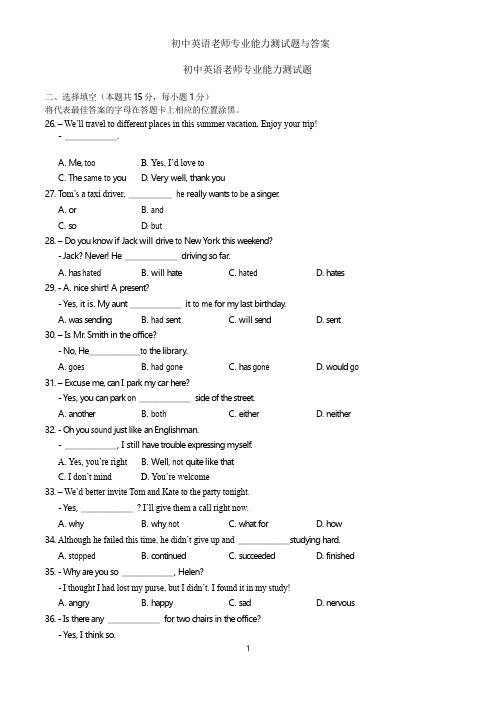
初中英语老师专业能力测试题与答案初中英语老师专业能力测试题二、选择填空(本题共15分,每小题1分)将代表最佳答案的字母在答题卡上相应的位置涂黑。
26.–We’ll travel to different places in this summer vacation.Enjoy your trip!-______.A.Me,tooC.The same to you B.Yes,I’d love toD.Very well,thank you27.T o m’s a taxi driver,_____he really wants to be a singer.A.or C.soB.and D.but28.–Do you know if Jack will drive to New Y ork this week end?-Jack?Never!He______driving so far.A.has hatedB.will hateC.hatedD.hates29.-A.nice shirt!A present?-Y es,it is.My aunt______it to me for my last birthday.A.was sendingB.had sentC.will se n dD.sent30.–Is Mr.Smith in the office?-No,He______to the library.A.goesB.had goneC.has goneD.would go31.–Excuse me,can I park my car here?-Y es,you can park on______side of the street.A.anotherB.bothC.eitherD.neither32.-Oh you sound just like an Englishman.-______,I still have trouble expressing myself.A.Yes,you’re right C.I don’t mindB.Well,not quite like that D.You’re welcome33.–We’d better invite Tom and Kate to the party tonight.-Y es,______?I’ll give them a call right now.A.whyB.why notC.what forD.how34.Although he failed this time,he didn’t give up and______studying hard.A.stoppedB.continuedC.succeededD.finished35.-Why are you so______,Helen?-I thought I had lost my purse,but I didn’t.I found it in my study!A.angryB.happyC.sadD.nervous36.-Is there any______for two chairs in the office?-Y es,I think so.A.groundB.floorC.spaceD.area37.-How was the performance last night?-It was so g ood.Though it______nearly four hours,few people left early.A.coveredB.reachedstedD.played38.I was late for school because my a larm clock didn’t______this morning.A.go onB.go offC.go awayD.go up39.-______you leave so soon?-Y es.I have to catch my plane.A.CanB.W ouldC.ShouldD.Must40.–What did that lady ask you just now?-She ask ed me______.A.who was I waiting forB.whether could I help herC.how she could get to the bus st opD.what has happened三、完形填空(本题共15分,每小题1分)阅读下面短文,掌握其大意,然后从41–55各题所给的四个选项中,选出一个最佳答案。
2024年教师资格之中学英语学科知识与教学能力真题精选附答案
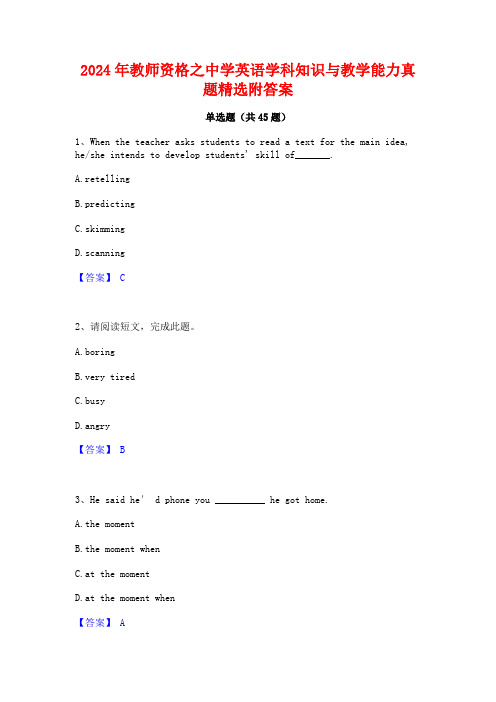
2024年教师资格之中学英语学科知识与教学能力真题精选附答案单选题(共45题)1、When the teacher asks students to read a text for the main idea, he/she intends to develop students' skill of_______.A.retellingB.predictingC.skimmingD.scanning【答案】 C2、请阅读短文,完成此题。
A.boringB.very tiredC.busyD.angry【答案】 B3、He said he′ d phone you __________ he got home.A.the momentB.the moment whenC.at the momentD.at the moment when【答案】 A4、The ultimate goal of English education is to develop students′ ability to communicate in English. There-fore, English education should be __________.munication-focusedB.ability-orientedC.knowledge-centeredD.speaking-oriented【答案】 B5、--The situation was in a mess.A.should developB.would developC.must have developedD.could have developed【答案】 D6、请阅读Passage 2,完成第小题。
A.is now enjoying legal supportB.disagrees with the tradition of the countryC.was clearly stated by the country's foundersD.will exert great influence over court decisions【答案】 A7、When a teacher intends to present or explain a new language point, which of the following grouping methods is mostly recommended?A.Whole class workB.Group workC.Pair workD.Individual work【答案】 A8、The Cognitive Approach holds that students′ mistakesare__________ in the creative use of language.efulB.understandableC.unavoidableD.reasonable【答案】 C9、Passage 1A.The more a person cheats, the more creative he isB.Cheating is likely to encourage creativity to some extentC.A person who cheats is more creative than a person who doesn' tD.A person who is creative cheats more than a person who is less creative【答案】 B10、Morphemes that represent "tense", "number", "gender", "case" and so forth are called__________ morphemes.A.inflectionalB.freeC.boundD.derivational【答案】 A11、请阅读短文,完成此题。
(完整版)初中英语学科知识与教学能力试题及答案

《英语学科知识与教学能力》(初中)一、考试目标1.英语学科知识与能力具有扎实的英语语言基础知识和语言能力;具备从事初中英语教学所需要的英语语言能力;能理解有关英语国家的语言、历史和文化等相关知识。
2.英语学科教学知识与能力掌握外语教学基本理论、英语教学专业知识与国家英语课程标准内容等学科教学知识,并能用以指导初中英语教学。
3.英语学科教学设计能力能够根据英语学科特点,针对初中学生的认知特点、语言水平和学习需要选择并设计合理的教学内容,形成完整合理的教学方案。
4.英语学科教学实施能力理解初中英语课堂教学实施的基本原则和方法,具备实施语言课堂教学的基本能力;能够根据教学设计,结合教学实际情况,采用恰当的教学手段,引导学生进行有效学习。
5.英语学科教学评价知识与能力了解初中英语课堂教学评价的基本知识和方法,能够对学生的语言学习进行恰当的评价;了解教学反思的基本方法和策略,能够对自己的课堂教学实践进行反思,提出改进的思路。
二、考试模块内容与要求(一)语言知识与能力1.掌握英语语言的基础知识,了解语言研究中与英语教学相关的基本概念和知识,并能在课堂教学中加以运用。
2.具有良好的英语语言运用能力,包括用英语进行书面表达、获取教学资源和信息、表达思想情感和与学生良好沟通的能力;能够筛选并改编适合初中学生英语水平的语言材料。
3.能够在语篇中理解英语国家的语言、历史和文学等相关的社会文化知识。
(二)语言教学知识与能力1.了解外语教学基本理论,理解语言观、语言学习观、语言教学观等对初中英语教学的指导作用。
2.理解《义务教育英语课程标准(2011年版)》的目标内容(语言技能、语言知识、情感态度、学习策略和文化意识),以及课程标准的其他相关知识,并能在教学设计与实施中运用。
3.掌握英语语言知识(语音、词汇、语法、语篇等)的教学基本原则、讲解和练习方法。
4.掌握英语语言技能(听、说、读、写)的教学原则和训练方法。
5.能结合中外社会文化语境,设计并实施英语知识和技能的教学与训练。
教师资格考试初级中学学科知识与教学能力英语试题与参考答案
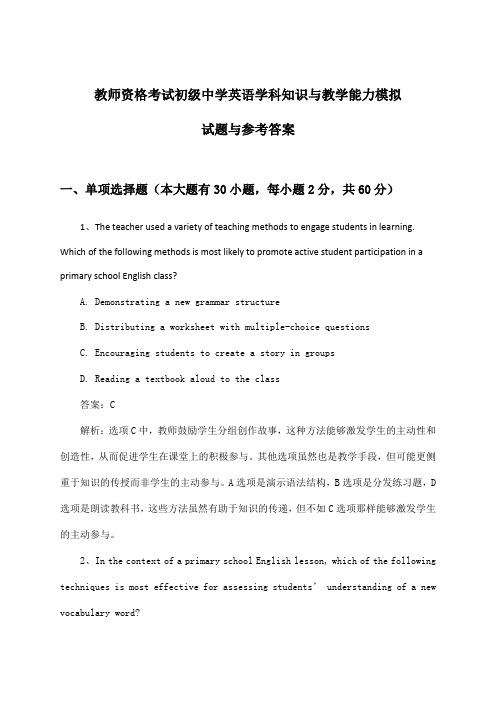
教师资格考试初级中学英语学科知识与教学能力模拟试题与参考答案一、单项选择题(本大题有30小题,每小题2分,共60分)1、The teacher used a variety of teaching methods to engage students in learning. Which of the following methods is most likely to promote active student participation in a primary school English class?A. Demonstrating a new grammar structureB. Distributing a worksheet with multiple-choice questionsC. Encouraging students to create a story in groupsD. Reading a textbook aloud to the class答案:C解析:选项C中,教师鼓励学生分组创作故事,这种方法能够激发学生的主动性和创造性,从而促进学生在课堂上的积极参与。
其他选项虽然也是教学手段,但可能更侧重于知识的传授而非学生的主动参与。
A选项是演示语法结构,B选项是分发练习题,D 选项是朗读教科书,这些方法虽然有助于知识的传递,但不如C选项那样能够激发学生的主动参与。
2、In the context of a primary school English lesson, which of the following techniques is most effective for assessing students’ understanding of a new vocabulary word?A. Asking students to define the word in their own wordsB. Asking students to complete a sentence with the new vocabulary wordC. Asking students to translate the word into their native languageD. Asking students to write a paragraph using the new vocabulary word答案:B解析:在小学英语课堂中,选项B最有利于评估学生对新单词的理解。
初级中学英语教师资格考试学科知识与教学能力试题及解答参考(2025年)
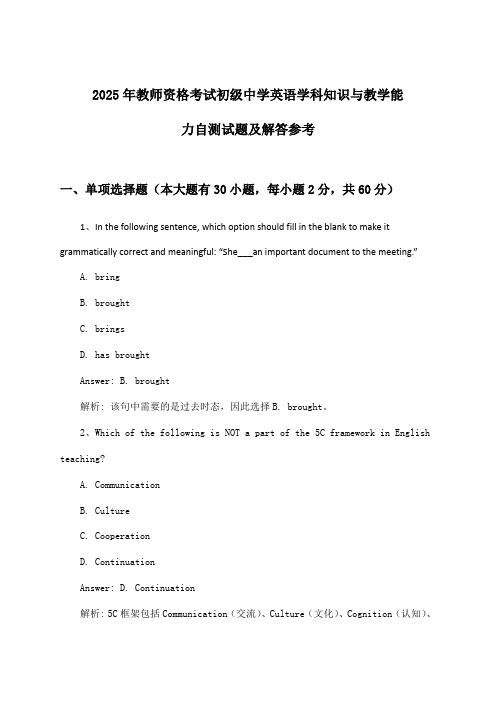
2025年教师资格考试初级中学英语学科知识与教学能力自测试题及解答参考一、单项选择题(本大题有30小题,每小题2分,共60分)1、In the following sentence, which option should fill in the blank to make it grammatically correct and meaningful: “She___an important document to the meeting.”A. bringB. broughtC. bringsD. has broughtAnswer: B. brought解析: 该句中需要的是过去时态,因此选择B. brought。
2、Which of the following is NOT a part of the 5C framework in English teaching?A. CommunicationB. CultureC. CooperationD. ContinuationAnswer: D. Continuation解析: 5C框架包括Communication(交流)、Culture(文化)、Cognition(认知)、Comprehension(理解)和Cohesion(连贯性),而Continuation并不是5C框架的一部分。
3、The present perfect tense is best used to describe an action that:A) Happens frequentlyB) Has just occurred or recently happenedC) Will occur in the futureD) Is in the process of happeningAnswer: B解析:Present perfect tense (has/have + past participle)通常用于描述一个刚发生或最近发生的动作,它强调的是动作的完成及其对现在的影响。
- 1、下载文档前请自行甄别文档内容的完整性,平台不提供额外的编辑、内容补充、找答案等附加服务。
- 2、"仅部分预览"的文档,不可在线预览部分如存在完整性等问题,可反馈申请退款(可完整预览的文档不适用该条件!)。
- 3、如文档侵犯您的权益,请联系客服反馈,我们会尽快为您处理(人工客服工作时间:9:00-18:30)。
初中英语教师专业知识考试题及答案初中英语教师专业知识考试题及答案第?卷选择题(共30小题,计60分)请将选择题的答案填在后面的表格中。
一.单项选择。
(共15小题,计30分)( )1. ---How much did you _______ on that woolen T-shirt ?---I _______ 80 yuan for it.A.cost, spendB. spend, paidC. pay, costD. take, cost ( )2 ---You look _______ sad, Kate.mistakes in my report.A.a little, a fewB. little, fewC. a few, a littleD. alittle, few.( ) 3. The _______ he is , the he feels. A. busily, happily B. busy, happy C busier , happier D .more busy, more happy( ) 4.-----I don’t know -----I think you should calm downand read texts.A. how to doB. what to do it .C. what to doD. when to do ( ) 5.I’d rather _____ at home than _______ to the movie on weekends .A. staying, goingB. to stay, to goC. stay, goD. stayed, went( )6. Not only I but also Tom and Jack _____ interested in English because it _____ useful. A. is, is B. is, are C. are, is D. are, are( )7. I can’t go _____ because I have to go home at once.A. else anywhereB. anywhere elseC. else nowhereD. somewhere else( )8. Why does this woman decided _____ these places?A. not goB. doesn’t goC. not goingD. not to go( )9. Would you please help me _____ the picture on the wall?A. put upB. put onC. put intoD. put off( )10. Excuse me, could you _____ me your new dictionary?A. borrowB. keepC. lendD. take( )11.The box is ________ heavy ________ I can’t lift it.A. too, toB. so, thatC. very, thatD. too, that( )12. Tom has made many friends since he________ to China.A. cameB. comesC. has comeD. will come( )13.He gave up ______two years ago. That’s to say, he is a non-smoker now.A. smokeB. smokingC. to smokeD. smoked( )14.Do you need ________ to read on the train?A. special anythingB. any special thingC. anythingspecially D. anything special( )15. The children were made ____ homework first. A. do B. to do C. did D. doing二.完形填空(20分)Food is very important. Everyone needs to well if he or she wants to have a strong body .Our minds also need a kind of food. This kind of food is knowledge even when we are very young. Small children are in everything around them. They learn while they are watching and listening. when they are getting older , they begin to story books , sciencebooks …anything they like . When they find something new, they love to ask questions and to find out the answers.What is the best to get knowledge? If we learn ourselves, we will get the most knowledge. If we are getting answers from others and do not ask why, we will never learn well. When we study in the right way, we will learn more and understand .()16. A. sleep B. read C. drink D. eat()17. A. start B. exercise C. knowledge D. meat()18. A. interested B. interesting C. weak D. better()19. A. everything B. something C. nothing D. anything ()20. A. lend B. read C. learn D. write()21. A. try B. have C. think D. wait()22. A. place B. name C. way D. news()23. A. on B. with C. to D. by()24. A. often B. always C. usually D. sometimes()25 .A. harder B. much C. better D. well三.阅读理解。
(10分)Each nation has many good people who help to take care of others. For example, some high school and college students in the United States often spend many hours as volunteers in hospitals, orphanages(孤儿院)or homes for the aged. They read books to the people in these places, or they just visit them and play games with them or listen to their problems.Other young people volunteers go and work in the homes of people who are sick or old. They paint, clean up, orrepair their houses, do their shopping or mow their lawns. For boys who no longer have fathers there is an organization called Big Brothers. College students and other men take these boys to baseball games or on fishing trips and help them to get to know things that boys usually learn from their fathers.Each city has a number of clubs where boys and girls can go to play games or learn crafts. Some of these clubs show movies or organize short trips to the mountains, the beaches,museums or other places of interest. Most of these clubs use a lot of high school and college students as volunteers because they are young enough to remember the problems of younger boys and girls Volunteers believe that some of the happiest people in the world are those who help to bring happiness to others.( ) 26. Where can you often find volunteers in the United States?A. At a bus-stop.B. In a park.C. In a hospital.D. In a shop. ( ) 27. How do volunteers usually help those who are sick or old?A. They mow their lawns, do their shopping and clean up their house.B. They cook, sew or wash their clothes.C. They tell them stories and sing and dance for them.D. They clean, wax and repair their cars.( ) 28. What is Big Brothers?A. It’s the name of a club.B. It’s a home for children who have no brothers.C. It’s the name of a film.D. It’s an organization for boys who no longer have fathers. ( ) 29. Why so most of the boys’ and girls’ clubs use many high school and college students as volunteers?A. Because they have a lot of free time.B. Because they can still remember what they felt when they were younger.C. Because they know how to do the work.D. Because they like younger boys and girls.( ) 30. What do volunteers believe?A. To make others happy, they have got to be unhappy.B. The happiest people in the world are those who make themselves happyC. the happiest people in the world are those who help to bring happiness to others.D. when they are happy, the others will be happy.第??卷(非选择题共计40分)四.任务型阅读(10分)Many people go to school for education. They learn languages, history, politics, maths and so on. Others go to learn askill so that they can make a living. School education is very important and useful. Yet, no one can learn everything from school. A teacher can’t teach his students everything. The teacher’s job is to show students h ow to learn. The teacher teaches them how to read and how to think. So the students themselves shall learn much more outside school. 根据短文内容,填上正确的单词或句子:1.As a student, they go to school for__________________________.2.Jim wants to find a job, at first, h e’d better go to school ____________________________.3.If we want to know the development of our country, we must learn ________________ well.4.In class, the role of a teacheris___________________________.5.The student who ________________________________________ is the best student.五.单词拼写(10分)1.The doctor told me that it was h _________________to eat vegetables.2.I find it hard to d __________________with family problems.3.You won’t pass the exam u__________________you work hard. 4. Mr and Mrs Smith have been m_________ for thirty years. 5. Salt is p_________ in South China.六.书面表达(要求80词左右,计20分)假如你将带领学生上山游玩,出发前,写几条注意事项,以保护环境。
